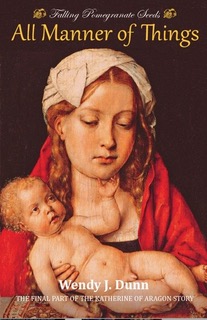Publication Date: January 15th 2021.
Genre: Historical Fiction.
Publisher: Poesy Quill Publishing
Print Length: 449 Pages
Winter, 1539
María de Salinas is dying.
Too ill to travel, she writes a letter to her daughter Katherine, the young duchess of Suffolk. A letter telling of her life: a life intertwined with her friend and cousin Catalina of Aragon, the youngest child of Isabel of Castile. It is a letter to help her daughter understand the choices she has made in her life, beginning from the time she keeps her vow to Catalina to share her life of exile in England.
Friendship, betrayal, hatred, forgiveness – All Manner of Things tells a story of how love wins out in the end.
"I serve Catalina with my life, and will until I die."
Queen Elizabeth had seen with her own eyes how the crown could destroy even the bravest of men. If Arthur were to die, and Henry ascended the throne, then it would destroy him as it had done her father and her husband. Queen Elizabeth had warned them what would happen, and she had been right. So very right. The way Henry had treated Catalina was eclipsed only by the way he had treated María. María had never known hate until she had unknowingly met the future King of England.
When the bell of the church tolled the hour, and the candles were just flickering flames at the end of a wick, María de Salinas, Baroness Willoughby de Eresby, put down her quill. The letter was finally finished. It was hard to die when your only daughter resented you and blamed you for her currently intolerable situation. But with a forlorn hope, María prayed that her daughter would come to understand the choices she had made and find it in her heart to forgive her, one day…
From a tender, yet forbidden, romance to the death of her dearest friend, Falling Pomegranate Seeds: All Manner of Things, Book #2 by Wendy J. Dunn is the unforgettable story of María de Eresby as she, along with Catalina of Aragon, learns to dance to a decidedly deadly Tudor tune.
Dunn has penned a gripping account of love, hate, loyalty and betrayal. But above everything else, Dunn has given her readers a novel that has been written with a sensitivity, not only to the plight of Catalina (Catherine) of Aragon, but also to the controversy that always seems to surround the English throne. Through the eyes of María, Dunn allows her readers to witness it all—the excitement, the disappointment, first love, abandonment, happiness, despair, loneliness, and a realisation that a woman had no control over her destiny. This was a man's world, and there was nothing that anyone, not even a queen, could do about it.
María is a protagonist that I simply adored. She is a remarkably brave and courageous young woman whose loyalty to her best friend is absolute. She is the one constant in Catalina's life—she was there near the beginning, and she would be there at the end, despite what Henry had to say about it. María's determination to remain constant, to not abandon Catalina, made her a character that I really came to care about, and although much of this story is centred around Catalina and the Tudor court, I came away from this book with a real sense of who María was. This novel has left me wondering why I have never come across María in literature before. Her story was one that was begging to be told, and I thought Dunn's portrayal of her was shamelessly compelling.
Likewise, Catalina was an arrestingly refreshing character. Dunn allows her readers to witness the young princess at the beginning of her journey to England, all the way to the end of her life, where a dying Dowager Princess of Wales was not even allowed the small mercy of seeing her only surviving child before she died. Catalina was an endlessly fascinating character. Her tender romance with Arthur, the appalling treatment she receives after his death, and then her subsequent marriage to Arthur's brother, makes for an endlessly fascinating tale. Throughout her marriage to Henry, Dunn hints that Catalina falls in love, not with the Henry that María knows, but with the ghost of his brother. Henry can be tender, kind and generous, but unlike Arthur, Henry is also flamboyant, full of life, and unfortunately inherently cruel and uncaring. Henry is a direct contrast to Arthur, who is pale, ill, but loyal and caring. Arthur’s love was real, Henry's, as real as it may have seemed at the time, was only ever going to be fleeting. He was a flame that the moths found irresistible, even if the outcome would scorch their wings and leave them broken and dying in the shadows.
Henry VIII, the monarch that is famous for all the wrong reasons is, as one would expect in a tale that involved the Tudor dynasty, a character that despite his charm, good looks and sense of humour hid a dark heart who relished in his own power. With the untimely death of his brother, Henry is thrust into the limelight far too early and, although his youthful extravagance and courtly manners hid all manners of sin for a time, the cruelty, the selfishness and the mercilessness of this king's dark soul would be etched in stone forever. Witnessed through the eyes of María, Dunn explores the complicated relationship between the young king and his Spanish bride. Dunn does not gloss over the dark nature of this infamous monarch. Henry is the antagonist in this story, and although Catalina is determined to see in him a shadow of what she had seen in Arthur, María is not so hoodwinked. Dunn has given her readers a Henry who is awfully easy to despise. She has also given us a plausible portrayal of a spoilt young child who grew up to be an extremely volatile and unpredictable monarch. Wyatt was right when he said that in Henry's kingdom, *circa Regna tonat and that is certainly the kind of king Dunn has given her readers. Despite Henry being the villain of this tale, I thought his depiction was superbly drawn, and he came across as very real in the telling.
Dunn explores in great depth the role of women in the Tudor era. Through the depiction of María and Catalina, Dunn shows her readers just how little control these women had over their own lives. They were dependent upon their fathers and husbands for everything. Catalina finds herself in a dire circumstance when Arthur dies. Her father's indifference to her letters and Henry VII's lack of compassion is heartbreakingly tragic. Catalina is treated abhorrently, and it really broke my heart to witness everything that this young woman had to go through, and in the end, as history tells us, she was passed over once again because, through no fault of her own, she could not give Henry a healthy male heir. Likewise, María finds herself in some perilous situations, and like Catalina, there is nothing she could do but comply, despite what that means for her own physical and mental wellbeing.
In this novel, reputation can either make you or see you locked up in the Tower and therefore, the fear of guilt by association is particularly pernicious. The plight of Edward Plantagenet, 17th Earl of Warwick, and indeed, Edmund Dudley demonstrated not only how cruel and fickle the crown was but also how the Wheel of Fortune turned so cruelly and how sometimes, to survive, you had to leave family and friends to their terribly unjust fate.
Falling Pomegranate Seeds: All Manner of Things, Book #2 by Wendy J. Dunn, is a novel that is absolutely irresistible from beginning to end. This is the kind of story that stays with a reader long after they have turned the last page.
I Highly Recommend.
Review by Mary Anne Yarde
The Coffee Pot Book Club.
*Wyatt, Thomas (1503 –1542): Innocentia Veritas Viat Fides Circumdederunt me intimici me, (1536).
Wendy J. Dunn
Wendy J. Dunn is an Australian author, playwright and poet who has been obsessed by Anne Boleyn and Tudor History since she was ten-years-old. She is the author of three Tudor novels: Dear Heart, How Like You This?, the winner of the 2003 Glyph Fiction Award and 2004 runner up in the Eric Hoffer Award for Commercial Fiction, The Light in the Labyrinth, her first young adult novel, and Falling Pomegranate Seeds: The Duty of Daughters.
While she continues to have a very close and spooky relationship with Sir Thomas Wyatt, the elder, serendipity of life now leaves her no longer wondering if she has been channeling Anne Boleyn and Sir Tom for years in her writing, but considering the possibility of ancestral memory. Her own family tree reveals the intriguing fact that her ancestors – possibly over three generations – had purchased land from both the Boleyn and Wyatt families to build up their own holdings. It seems very likely Wendy’s ancestors knew the Wyatts and Boleyns personally.
Connect with Wendy:
Website • Facebook • Instagram • Twitter • Goodreads.








It sounds wonderful. I read the first book and loved it. Thanks for such a great review.
ReplyDeleteI'm really looking forward to reading this! Great review, thank you. Michelle t
ReplyDelete